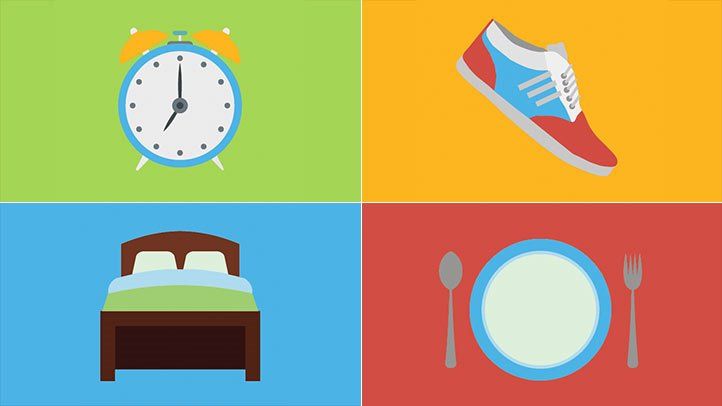Effective Daily Routine to Combat Hypothyroidism Fatigue
# Effective Daily Routine to Combat Hypothyroidism Fatigue
Ever felt like you’re wading through molasses just to get through your day? If you’re grappling with hypothyroidism, this feeling of fatigue might be all too familiar. Managing hypothyroidism isn’t just about popping pills; it’s about creating a daily routine that works for you. Let’s dive in and explore how an effective daily routine can help you fight off that relentless fatigue associated with hypothyroidism.
## Understanding Hypothyroidism and Its Fatigue
To kick things off, let’s chat about what hypothyroidism really is. In simple terms, your thyroid is like the gas pedal of your body. It regulates metabolism, energy levels, and overall hormonal balance. When your thyroid slows down, so does everything else. Fatigue is one of the most common symptoms, but it’s just one piece of the puzzle.
Think of it this way: if your body is a car, hypothyroidism is like driving with a faulty fuel pump. No matter how much gas you put in, the car just doesn’t perform as it should. This low energy can affect your mood, professional life, relationships, and even your ability to enjoy hobbies. Bummer, right? But don’t worry; with a few lifestyle tweaks, you can regain control and boost your energy levels.
## Crafting Your Daily Routine
Alright, let’s talk about building a daily routine that works for you. Here are some key components to get started:
### 1. Prioritize Sleep
**Sleep is your secret weapon**. It’s critical for healing and energy replenishment. Think of sleep like a phone charging overnight; without it, you’re going to wake up with a low battery. Try these tips to improve your sleep:
– **Set a consistent bedtime**: Going to bed and waking up at the same time each day helps regulate your internal clock.
– **Create a sleep-conducive environment**: Make your bedroom a fortress of comfort. Use blackout curtains, keep your room cool, and eliminate noise.
– **Limit screen time**: The blue light from devices can mess with your melatonin levels. Aim to unplug 30 minutes before bed.
### 2. Fuel Your Body Right
What you eat plays a massive role in how you feel. Think of your body as a high-performance vehicle; it needs the right fuel to run properly. Here’s how to rev up your engine:
– **Balanced Diet**: Emphasize whole foods—fruits, vegetables, lean proteins, and healthy fats. Think of your plate as a rainbow; the more colors, the better.
– **Stay Hydrated**: Dehydration can zap your energy. Aim for at least eight glasses of water a day. In hot weather or after exercise, increase your intake accordingly.
– **Consider Supplements**: Talk to your doctor about adding selenium and zinc to your diet, as these minerals can support thyroid function.
### 3. Get Moving
Being active helps reduce fatigue and mood swings. It might sound counterintuitive—why would exerting energy help with fatigue? But think about it this way: just like a bicycle that takes a little push to get rolling, your body needs movement to boost energy levels.
– **Find Activities You Enjoy**: Whether it’s brisk walking, dancing, yoga, or swimming, do what makes you happy.
– **Start Small**: If you haven’t been active lately, don’t overdo it. A gentle stroll or some light stretching can work wonders.
– **Consistency Is Key**: Aim for at least 30 minutes of moderate exercise most days of the week. It doesn’t have to be a marathon; just keep moving!
### 4. Manage Stress
Stress is a vampire that sucks the life out of you, especially when you’re dealing with hypothyroidism. Here are a couple of techniques to help with stress reduction:
– **Mindfulness and Meditation**: Taking just 10 minutes a day to meditate can clear your mind and refresh your spirit. Apps like Headspace or Calm can guide you through it.
– **Breathing Exercises**: Deep breathing can reduce anxiety and help ground you. A simple technique is to inhale deeply for four counts, hold for four, and exhale for four. Repeat this for five minutes.
### 5. Create a Daily Schedule
Having a structured daily plan can mitigate the overwhelm that comes with fatigue. When you know what to expect, it’s easier to conserve your energy for critical tasks.
– **Use a Planner**: Write down everything from work tasks to self-care. A planner helps keep your mind uncluttered.
– **Prioritize Tasks**: Do the most challenging tasks when you have the most energy. For many, that’s first thing in the morning.
– **Schedule Breaks**: Don’t forget to include short breaks in your schedule to recharge your batteries throughout the day.
## Monitoring Your Progress
Tracking your progress can be insightful. Consider maintaining a journal where you log your physical and emotional wellbeing, energy levels, diet, and activities. This can help you identify patterns over time and adjust your routine as needed.
## Social Connections Matter
Don’t forget, connecting with friends and family can be incredibly restorative. Share your experiences with them. You might discover that others feel similar fatigue and you can support each other. Join support groups, whether online or in person. Sharing with people who understand can provide solace and innovative tips on fighting fatigue.
### 6. Consult Your Healthcare Provider
Lastly, always keep the lines of communication open with your healthcare provider. Regular check-ups and medication adjustments are vital to managing hypothyroidism effectively. Your doctor can help you tweak your lifestyle plan based on how you’re feeling. It’s all about team effort!
## Conclusion
In wrapping this up, let’s remember that combating hypothyroidism fatigue doesn’t happen overnight. By building a tailored daily routine that prioritizes sleep, nutrition, exercise, stress management, and social connections, you can reclaim your energy and vitality. It’s like planting a garden: with some nurturing and care, you’re bound to see blooms of energy and health flourish.
### FAQs
**Q1: How does hypothyroidism cause fatigue?**
Hypothyroidism slows down the body’s metabolism, leading to decreased energy production. This sluggishness can manifest as an overwhelming sense of fatigue.
**Q2: Can exercise really help with fatigue from hypothyroidism?**
Absolutely! Regular physical activity can boost energy levels by enhancing circulation, improving mood, and promoting better sleep, even if it feels daunting at first.
**Q3: What dietary changes should I consider to combat hypothyroidism?**
Focus on a balanced diet that includes whole foods like fruits, vegetables, lean proteins, and healthy fats while ensuring you’re well-hydrated.
**Q4: How important is sleep for someone with hypothyroidism?**
Sleep is crucial. Quality sleep helps your body recharge and can significantly alleviate feelings of fatigue, making it one of the first areas to improve.
**Q5: Is it essential to consult a doctor when managing hypothyroidism?**
Yes! Your healthcare provider can help tailor your management plan, adjusting medications and offering additional guidance as needed to keep you feeling your best.







